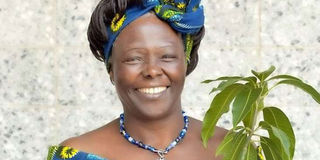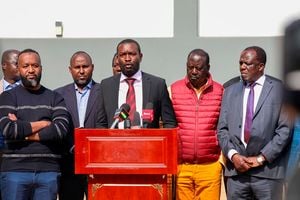Prof Maathai relentlessly fought State to save Uhuru Park, Karura Forest

What you need to know:
- Starting late 1980s, she became a thorn in the flesh to the government of the late retired President Daniel Arap Moi who died last Monday aged 95.
“In the course of history, there comes a time when humanity is called to shift to a new level of consciousness, to reach a higher moral ground. A time when we have to shed our fear and give hope to each other. That time is now,” the late Prof Wangari Muta Maathai once said.
These words seems to have electrified Maathai, propelling her into a collision course after differing with the Kanu government on several fronts.
Starting late 1980s, she became a thorn in the flesh to the government of the late retired President Daniel Arap Moi who died last Monday aged 95.
Maathai, the first Kenyan woman professor, shot into national limelight when she stood against the ills that were being committed by the Kanu government, a thing that was at the time considered suicidal.
She particularly came to prominence in 1989, when she led a vigorous campaign to stop the government from constructing a multi-billion complex at Nairobi’s Uhuru Park.
Moi, planned to build a Times Media Complex, a 60-storey tower and complex in Uhuru Park, which would accommodate Kanu’s headquarters, offices, shopping malls and parking for hundreds of cars.
Maathai and other pro-democracy crusaders challenged Moi in court and waged an international campaign that culminated into the government abandoning the Times’s complex plan in February 1990. This marked her first win against the ruthless Kanu regime.
To date, her victory against the Kanu government on the proposed 60-storey building remains etched in the minds of many Kenyans.
MAD WOMAN
Towards the end of February in 1992, Maathai who had just been released from police custody, irked Moi further. She joined the mothers and relatives of political prisoners in detention, at Uhuru Park, Nairobi, for a hunger strike to press for their release.
Their hunger strike was, however, never to last as on March 3, 1992, police forcefully dispersed them in an attack that was marred by violence and bloodshed.
Maathai and three others sustained serious injuries occasioned by the altercation with the police.
Following this clash with security forces, Moi called her “a madwoman” who was “a threat to the order and security of the country”.
The violent beatings of the mothers and their supporters, made newspaper headlines sparking riots across Nairobi.
Civil societies and opposition groups including the Forum to Re-establish Democracy and Release Political Prisoners pressure group, Women’s organisations among them Mothers in Action, and the National Council of Women of Kenya, joined in the campaign to have the prisoners released.
For months, the mothers held daily meetings outside the All Saints Cathedral church in Nairobi, to speak to their growing numbers of supporters as they pushed for the release of their sons.
Their attempts to deliver a petition to President Moi were turned away by police forces.
However, after the pressure became unbearable, four of the political prisoners were released on June 24, 1992. By January 1993, all the mothers had been reunited with their sons.
That marked Maathai’s second win against the oppressive Kanu regime.
Prof Maathai would again in 1998, capture both national and international attention when she led a campaign against fraudulent allocation of Karura Forest to private developers in Nairobi by the Kanu regime.
In her autographyUNBOWED: One Woman's Story Maathai the former Tetu MP and assistant minister for Environment and Natural Resources, details how she fought to save Karura Forest.
“This was an example of land-grabbing so blatant and extensive that I knew this would be a fight we could not afford to lose,” Prof Maathai writes in her memoirs.
She says her protest letters to the government to halt any deforestation and grabbing of the forest bore no fruits as they went unanswered.
In September 1998, she went to Karura to assess the situation and discovered that a road had already been dug, and workers were laying down what looked like a drainage system.
Maathai together with some members of Green Belt Movement (an organisation she founded in 1977 to promote environmental conservation; build climate resilience, and empower communities) started planting trees but were attacked and injured by young men wielding machetes, who uprooted the trees they had planted.
KARURA ATTACK
“I put my hands to my head and found it was bleeding. Strangely, my mind was very clear and calm.
"Now, why would he do something like that?" I asked myself. "Why would he hit me?” she writes.
The attack received universal condemnation with the US ambassador, members of the Kenyan clergy and opposition MPs.
The then UN Secretary-General, the late Kofi Annan also condemned the beating and the violence that accompanied it.
Being a person who never gave in to defeat easily, Maathai continued waging war against the Kanu government over the excision of the forest.
Her campaign received a boost after the media, international community, clergy and politicians, joined her bid to save the forest. The government eventually bowed to the pressure and halted the excision of the forest,
“On August 16, 1999, the President announced that he was banning, with immediate effect, all allocation of public land. Soon, all construction in the forest ceased and even the hired thugs were moved out,” says Prof Mathai in her memoirs.

In 2004, the late professor of Veterinary Anatomy was awarded the Nobel Peace Prize.
The Norwegian Nobel Committee gave Prof Maathai’s contribution to “sustainable development, democracy and peace.” as attributes they considered in settling on her for the prize.
The environmental activist cum politician, was born on April 1, 1940. She died on September 25, 2011 from cancer aged 71.





